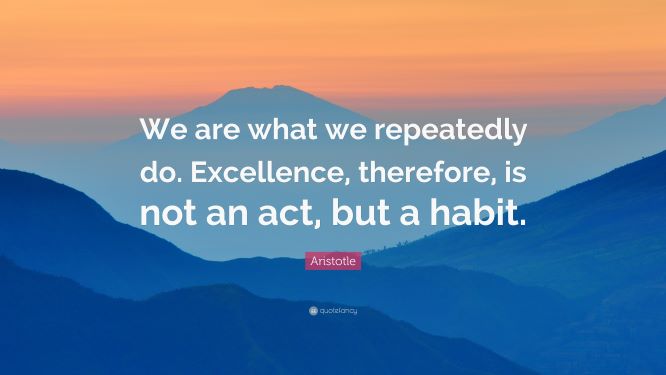Photo from Quotefancy.com
Continuing on last week’s article, today I am going to share what I think is some interesting and worthwhile information about Habits.
What is a Habit? Why are they so important?
I like the Cambridge Dictionary definition of Habit: “something that you do often and regularly, sometimes without knowing that you are doing it.”
Habits are important because 1) they are something we do a lot and 2) usually we do it without consciously deciding that it is something we are going to do. The reason for habits is that they help us minimize the number of decisions and amount of thinking that our brain has to do each day. The brain has learned to shut down to some extent and literally goes on “autopilot” with habits to help conserve energy and prevent overwhelm.
A 2006 Duke study found that habits comprise more than 40% of our actions taken every day. Almost half of what you do every day is a habit! Think about it, when you shower and wash yourself, you don’t debate and decide HOW to do it. You just do it without thinking. This is a habit.
Your brain does not know if a habit is “good” or “bad.” It just knows that it saw a pattern repeated enough to create the habit.
There are 4 main components to a habit:
1) A cue – something that marks the beginning of the behavior,
2) The routine – the repeated behavior which is when the brain goes to sleep.
3) The reward – what the brain learned will come automatically. The reward can be why you want to do something or what you get out of doing something.
4) The craving is when the brain starts expecting the reward. In a sense it is the craving that creates the habit’s power and makes it last and imprints it into the brain.
Habits rarely disappear. They are easier to change than to remove. To change an existing habit, you want to keep the same cue and the same reward and change the behavior in between.
For example, every afternoon at 3:00 you start to feel sleepy. That tired feeling is your cue or maybe even the time on the clock has become your cue. Your routine is to go get a cup of coffee and a cookie. The reward is the yummy treat and a sugar and caffeine pick-me-up that you feel. You may want to change this habit for various reasons – the coffee is preventing you from going to sleep at night or you would like to stop the upward climb on the scale and know that the cookie is not very good for you or your waistline.
To change this habit, the cue and the reward stay the same and you want to come up with healthier alternatives in replacement of the old habit and routine. You could try eating a piece of fruit such as an apple or a small piece of dark chocolate or going for a short walk with a friend. The new routine has to give you a comparable reward. The replacement should still give you a boost of energy, provide a pleasurable break and yet it will be healthier for you. Only you know what will work for you and you may have to try various things to find the right one.
Any change is hard, so be patient with yourself and make a commitment to keep at it until you have achieved success.
In summary, habits are important because they comprise so much of our daily behaviors. They shape our actions and therefore our results because of their frequency. They have a sneaky power because we follow the routine without thinking and they are challenging to change. Our brain will hold onto habits even when they no longer make logical sense.
Next week, I will talk about some key ways and things to consider when making a new healthy habit.
Have a fabulous week!
Tara


Recent Comments